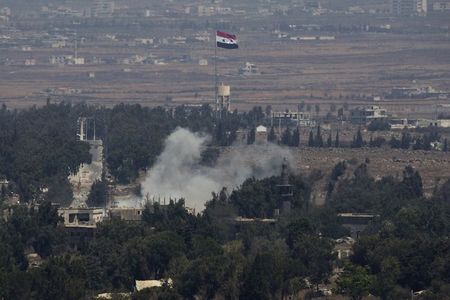By Luke Baker
QUNEITRA Golan Heights (Reuters) - U.N. officials shuttled along the rocky frontier between Syria and the Israeli-occupied Golan Heights on Friday, trying to establish the whereabouts of 44 United Nations peacekeepers seized by al-Qaeda-linked militants inside Syria.
Israeli forces took up positions at Quneitra, a fortified crossing between Syria and the Golan, barely 400 metres (437 yards) from Nusra Front militants who attacked a U.N. base on the Syrian side of the border on Wednesday and seized the 44 Fijians.
Some 72 other U.N. soldiers, all from the Philippines, remained locked down in two camps on the Syrian side of the frontier, U.N. officials and military officials in the Philippines said. All 116 peacekeepers are part of UNDOF, a U.N. force that has monitored the disengagement zone between Israel and Syria since 1974 in the wake of the 1973 Arab-Israeli War.
UNDOF officials declined to comment as they left one of their compounds on Friday. UNDOF has 1,223 peacekeepers from six countries operating in the zone.
Israeli soldiers, including some redeployed from Gaza, prevented anyone from moving too close to the border.
"We're not doing anything, we're just watching," said an Israeli officer, his platoon hunkered down behind a mound of rocks a few hundred yards back from the crossing, the blue U.N. flag fluttering above the compound in the near distance.
From a lookout point on the Israeli-controlled side, with views across southeastern Syria, Nusra Front rebels could be seen moving on motorbikes and in pick-up trucks, while further away the Syrian army battled opposition forces.
The sound of shelling and heavy gunfire echoed across the valley and plumes of smoke rose from buildings as the fighting played out barely two km (1.2 miles) away.
It was the third time in two years that UNDOF troops had been seized on the Syrian side of the demarcation zone, a measure of the instability since the uprising began against Syrian President Bashar al-Assad. Until then, UNDOF had been one of the quietest U.N. peacekeeping posts anywhere in the world.
In both previous cases those seized were released within days, U.N. officials said. But the situation appeared to be more precarious this time. A militant close to the Nusra Front said the Fijians had been taken because they had been providing medical treatment to wounded soldiers from Assad's army.
"The United Nations is engaging with a wide range of parties within Syria," Stephane Dujarric, a U.N. spokesman in New York, told reporters, adding that it was also speaking with "member states who may have influence over armed opposition elements to encourage their safe release."
A U.N. official told Reuters that Qatar was one of the countries with which the United Nations had been in touch about securing the freedom of the peacekeepers. The Gulf Arab state in recent days helped secure the release of an American writer long held by Nusra.
TWO WEEKS OF FOOD AND WATER
In Manila, a senior officer said the Filipino troops holed up on the Syrian side were well-armed, well-trained and had no intention of surrendering to the rebels.
"Our position is a well-fortified position in the area of separation," said Colonel Roberto Ancan, commander of the Philippines Peacekeeping Mission Operation Centre.
The Nusra Front had used a Fijian to urge the Filipinos to surrender, he said, but they would not.
"This is just part of the job and they are committed to the mission at hand," Ancan said.
Several U.N. officials told Reuters that the Filipinos had about two weeks of food and water rations.
The Golan is a strategic plateau captured by Israel in the 1967 Middle East War and Syria and Israel technically remain at war. UNDOF monitors the area of separation, a narrow strip of land running about 45 miles (70 km) from Mount Hermon on the Lebanese border to the Yarmouk River frontier with Jordan.
A high, rocky plain dotted with mountain peaks and scattered with fruit farms and vineyards, it is also a popular destination for Israelis and foreign tourists.
The fighting did not appear to deter them.
In slightly surreal scenes, tour groups gathered to watch the battle unfold from a viewing point, including a busload of German visitors and a group of Orthodox Jews.
"I feel safer here than I would do in San Francisco," said David Schneider, 62, a New Yorker who moved to Israel 30 years ago, watching the rebels through a pair of binoculars.
Another local resident, a former Israeli soldier who fought against Syria in the 1967 war, when the Golan Heights were seized, and then again in 1973, called out the types of weapons being used, identifying them by their sound.
"That's a Russian-made .50 calibre gun," he said as a heavy "rata tat" thudded across the plain. "The Syrian army has those."
Israeli civilians employed by UNDOF were told not to enter the base on the Israeli side on Friday, amid fears of attack from across the demarcation line. They too gathered on a high hill looking into Syria to observe developments.
One employee, Arab-Israeli mechanic Adel Bashaw, said he had been in the UNDOF compound on Wednesday when the Nusra Front militants attacked the nearby crossing point.
"It was like everything was on fire," he said, showing a video on his mobile phone of heavy shelling.
Philippine army officials said hope remained for an easing of the situation despite the standoff with the Philippine peacekeepers and the lack of knowledge of the precise whereabouts of the Fijians.

The Philippine Foreign Ministry called on the United Nations "to exert every effort to ensure the safety and security of all peacekeepers in UNDOF", which consists of Indian, Nepalese, Irish and Dutch troops, as well as the Fijians and Filipinos.
(Additional reporting by Rosemarie Francisco in Manila, Mariam Karouny in Beirut and Louis Charbonneau at the United Nations)
